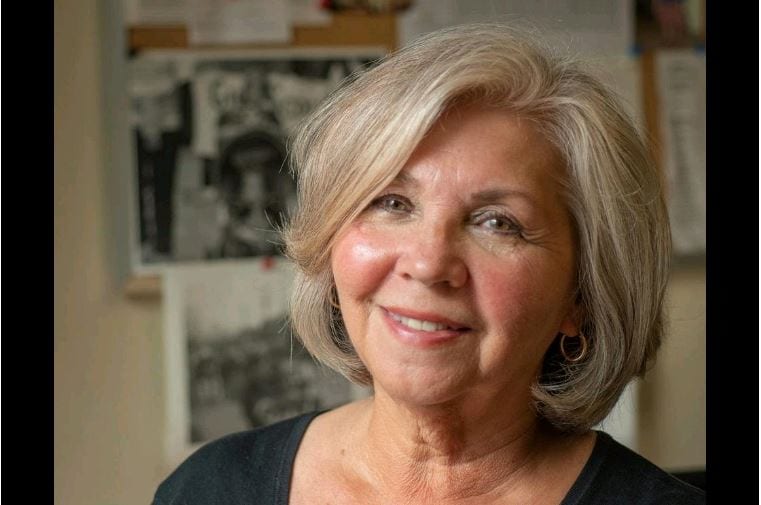
August 12, 2019
One on One: Dianne Sandman, senior paralegal at Community Legal Aid
By Anissa Gardizzy, Special to the Telegram & Gazette
Posted Aug 11, 2019 at 6:00 AM
Dianne Sandman is a fan of fairness.
As a child, she said “that’s not fair” often and always spoke up for herself and others. Her tendency to demand fairness and justice has always been there, and now she uses it to help others.
Ms. Sandman is a senior paralegal at Community Legal Aid in Worcester where she works in the elder unit. She has been working there for 38 years, through a few name changes and building relocations.
Ms. Sandman graduated from Anna Maria College in 1980 with a certification in paralegal studies. She began her professional career as a volunteer at the then-called Central Mass. Legal Services and was hired a year later to work in the elder unit.
During her career she has earned various awards for excellence in her field, including the Rosalie Wolf Award in 2019 and the Worcester County Bar Association’s Liberty Bell Award in 2015.
A self-proclaimed “semi-retiree,” Ms. Sandman is slowly winding down her professional career, which she said defines herself.
What does it mean to be a paralegal in elder law? How is it different from being a lawyer?
I work under the supervision of my attorney supervisor and under her license so that I can represent clients in administrative matters. I handle my own caseload and do hearings and negotiations. I’m an advocate, I have a bachelor’s degree and specialty in paralegal studies. In a typical day I could give advice to [elders], represent an elder, hold a hearing, or work on funding or grant work.
You volunteered at Central Mass. Legal Services in 1981 in the elder unit where you were hired a year later, can you talk about that transition?
I was looking for a paying job, and I had a second interview at another local law firm. They were like ‘who is going to take all these cases’? So they scraped together some money — this was back during the Reagan cuts to legal services. With the loss of some salaries, they were able to take me on. Because it was such a good fit, I decided I wanted to stay.
You wrote in the Telegram (As I See It column) that when people think of elder abuse, the stories that make headlines come to mind. What kind of elder abuse flies under the radar?
A lot of it happens behind closed doors. It might be a form of domestic violence or financial abuse. Family members might threaten to throw them in a nursing home. It could be getting them to cosign a loan, like for school or a car, then the [bank] comes after the senior. Unless someone goes into the home, you might not know, because the elder is probably not going to speak out about it.
Have you seen any noticeable trends during your time in the profession?
We are seeing a lot of problems as a result of the opioid crisis. A lot of adult children are looking to their parents to support them. They move in with their parents and put them at risk of eviction if they are in elderly housing. They take their money, credit cards, and run up debts.
You sound passionate about your work, where does this dedication stem from?
As a child, I always had a sense of fairness and justice. I always felt like I should be treated equally. In the ’60s things were not that equal for women. The thing I like about legal services is that it is very egalitarian. I always had as much say as an attorney, and I liked that. It wasn’t like I just helped an attorney on a case, I was an advocate and I was respected as such.
You mentioned having an “affinity for the elderly,” where does that come from?
My mother used to always take care and do special things for elderly neighbors, and I would go along with her. Maybe it’s genetic. I never could bear to see an elder be mistreated.
How often do you deal with scams that swindle elders to offer their Social Security or credit card number over the phone?
It happens a lot, even with all of the information out there. I tell my clients to just hang up. It’s not that the [elders] are stupid, it is that they are trusting and they want to help. The people who do it are skilled, and I think it is sad that they don’t use their skills to offer something positive to the world.
You said you are “semi-retired,” can you explain what you mean by that?
I knew that I wouldn’t be able to retire cold turkey, because I’m an advocate, that’s my identity. I’m grateful that my office allowed me to go part-time, so I’m weaning myself from the work and gradually winding down. I have a part-time antique business that I do on the weekends sometimes.
Do you see any correlation between your interest in antiquing and working with elders?
I value things that have been around for a while. The longer you have been around, the more value you have, I think. You wonder what a piece has been through, what it has seen, and it’s the same with people. We don’t always value our elders, but there is a wealth of knowledge and experience that they have to offer.”

















































